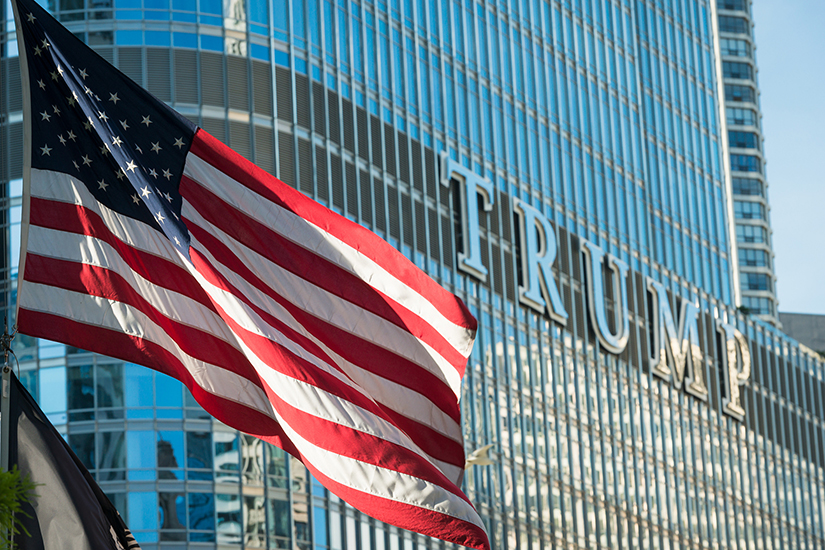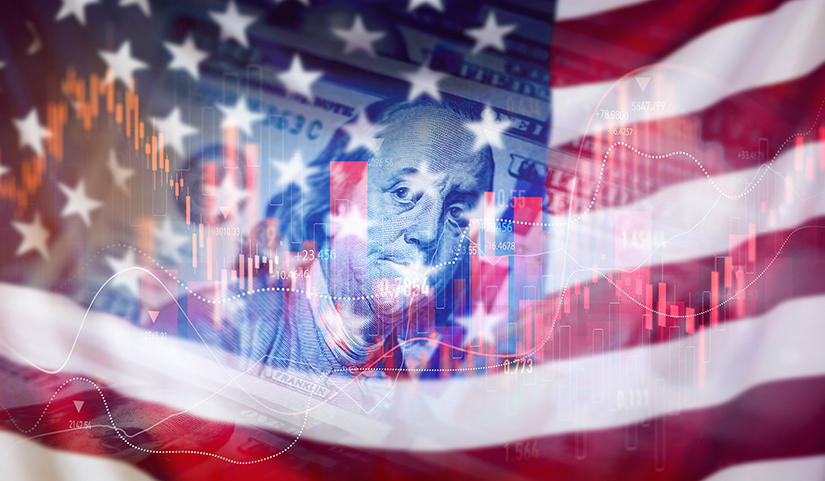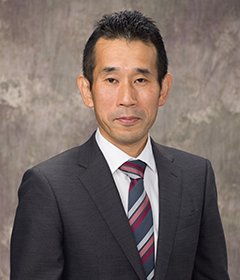On January 20, 2025, the second administration of President Donald Trump began in the United States. Trump campaigned during the presidential election under the slogan "Make America Great Again (MAGA)," but this does not imply international isolationism. MAGA signifies that "the United States, once a superpower, has weakened its own economy by becoming too involved in the conflicts of other countries. It aims to resolve these conflicts quickly, concentrate resources on fighting America's greatest adversary, and revitalize the domestic economy."[1] The goal is to maximize America's economic interests by ceasing to act as "the world's policeman" and reconstructing "American hegemony."[2] Additionally, with China set as America's greatest threat, Trump has proceeded to appoint hawkish personnel towards China to eliminate its influence over the U.S.. Trump has made claims regarding the U.S. annexation of Greenland and the return of control over the Panama Canal, which should be viewed as countermeasures against China's rise[3]. This article will explore the background behind the Trump administration's prioritization of China as a critical issue and discuss how global circumstances may change in the future, as well as what Japan should do.

China as a Critical Issue for Trump 2.0
The Trump administration has designated China as the greatest threat lies in Beijing's long-term and strategic pursuit of global hegemony by 2049. Chinese leader Xi Jinping is promoting a "100-year plan" with 2049, the centennial of the founding of the People's Republic of China, as its target year, aiming for "The Great Rejuvenation of the Chinese Nation." In reality, this plan seeks for "China to surpass not only economically but also militarily other countries, including the United States, aiming for global hegemony."[4] Currently, China is advancing its Belt and Road Initiative; however, strategic and geopolitical researcher Ivaylo Valchev points out that this should be viewed not merely as an effort to build an independent supply chain system, but rather as constructing an independent economic system for securing military superiority[5]. This groundwork laid by China is steadily expanding not only in Asia and Africa[6] but also in South America[7].
On the other hand, while China actively seeks to strengthen its political and military systems externally, its domestic economy is showing signs of slowing down, with significant disparities between urban and rural areas posing serious problems[8]. Therefore, there is room for debate regarding whether smooth economic growth as envisioned in the 100-year plan can be expected. However, China is also focusing on innovation[9], and it is likely that its economy will continue to expand in the near term.
China is not only building its own system but also collaborating with countries like Russia through initiatives such as BRICS and joint military exercises[10]. BRICS brought in four new countries including Egypt in 2024, growing into a multilateral system of nine nations. China and Russia recently conducted joint military exercises in the South China Sea[11]. Thus, China is preparing to build its hegemony while establishing a counter-system against the Western alliances through collaboration with other nations.
The World Under Trump 2.0
Trump's negotiation-focused approach is highly unpredictable, making it difficult to forecast how international society will react to Trump 2.0 and how China's engagement with international society will change. However, several developments can be anticipated:
First, under "America First" policy, some countries may strengthen their ties with U.S. based on U.S. economic interests, but many others may see their relationships cool if deemed not directly beneficial to U.S. interests. Second, withdrawal from multilateralism and divergence from internationally agreed "rule-based governance," may occur, particularly regarding issues like Palestine and climate change, potentially leading to a drift away from the U.S. among the countries of the Global South.
With Trump's election resulting in a "trifecta" scenario where Republicans control the presidency and both houses of Congress, this situation may only last two years until the midterm elections in 2026. If clear results are not achieved during this period, support for Trump may significantly decline. Conversely, if China can manage domestic dissent effectively, it may continue to advance its long-term global hegemony without facing such short-term risks.

What Should Japan Do?
In light of changing global circumstances under the Trump administration, Japan should promote the following actions:
First, strengthen U.S. engagement in Asia. For Japan, peace and stability in Asia are even more critical than for the U.S.. During Trump's first administration, after North Korea declared it was targeting Guam with missile attacks, Trump stated he would unleash "fire and fury" on Pyongyang, successfully deterring North Korean actions[12]. Although Taiwan remains a significant issue for Trump concerning relations with China, it is uncertain how far he would go if an emergency occurs in or around Taiwan, as his priority is America's economic interests[13]. Japan has a comparative advantage in the deep personal networks with the U.S. that other Asian countries lack; thus, it should play a role in maintaining U.S. engagement in Asia.
Second, strengthen unity among allies. Trump has indicated that additional tariffs will be imposed unless allies like Canada and the EU take necessary measures on trade deficits and immigration inflows[14]. If allies cannot withstand such pressure, divisions among them may emerge and weaken collective negotiating power of alliances[15]. To prevent this weakening of unity among allies, Japan should play a role in connecting the U.S. with its allies. Japan took a leading role to save the Trans-Pacific Partnership Agreement (TPP) free trade agreement after the first Trump administration withdrew from the initiative.[16] Japan will likely need to take on such a role again.
Third, Japan should advocate for multilateralism while ensuring that the U.S. does not drift away from it. Regarding climate change, Trump is attempting to shift focus away from the international community's established climate initiatives and pivot towards fossil fuel-centered development. The impacts of climate change on countries worldwide are evident, and the U.S. itself faces serious consequences such as wildfires in California and storm damage in Florida. During this time, countries in the Global South are intensifying their push towards decarbonization[17]. Departing from these international efforts will only deepen the U.S.' isolation[18]. Promoting the "rule of law" agreed upon by the international community is also crucial. Currently, there is a growing trend towards "governance by force" through military and political intimidation, which encourages more military spending and strains budgets needed for essential social welfare. It is important to shift the global trend from "governance by force" to the internationally agreed-upon "rule of law." For this reason, multilateralism should be promoted as a common value worldwide. Sheila Smith, a senior fellow at the Council on Foreign Relations, notes that "Japan has a long-term strategy and foundational assets that are not present in the West." Jeffrey Hornung from RAND's National Security Research Division points out that "Japan has a lot of soft power through diplomacy, development assistance, and economics, but its value is often underestimated."[19] Japan has built substantial trust with countries in the Global South, yet Japan itself seems unaware of how valuable this is. For resource-poor Japan, establishing trust and promoting cooperation with countries in the international community is essential for survival. Japan should leverage these unique assets to actively promote cooperation and trust-building within the global community.
Finally, Japan should independently push for strengthened relations with countries in the Global South. These nations are currently experiencing a significant evolution. Traditionally reliant on oil resources, Saudi Arabia and the UAE are advancing hydrogen energy development and pursuing energy policies that do not depend on fossil fuels[20]. South Africa has advanced the International Criminal Court's actions regarding Israel's attacks on Gaza, while Qatar is mediating peace negotiations in the Middle East. In ASEAN countries, some hope for strengthened ties with nations like Japan and Australia to avoid being caught up in U.S.-China tensions[21]. Japan should pay attention to these trends in the Global South and take action to deepen its relationships in the international community.
In 2025, Japan is set to host the Tokyo International Conference on African Development (TICAD). Japan was the pioneer in hosting such international conferences by organizing the first TICAD conference back in 1993. However, trade volume with Africa, investments in Africa, and Japan's visibility there are not necessarily high compared to the results of other countries' proactive approaches. For Japan's future, Japan should strengthen its own efforts at deepening ties and cooperation with other countries.

This paper was prepared based on information available as of January 18, 2025. The views expressed herein represent those of the author alone, and do not necessarily reflect official views held by affiliated organizations.
(2025/01/30)
Notes
- 1 Chad Wolf et al, "AFPI Releases New Book: An America First Approach to U.S. National Security," America First Policy Institute (AFPI), May 9, 2024.
- 2 Matias Spektor, "Rise of the Nonaligned: Who Wins in a Multipolar World?" Foreign Affairs, January 7, 2025.
- 3 Lian Ye-zheng, "A Unipolar World?", Newsweek, January 15, 2025.
- 4 Ivaylo Valchev, "China's 2049 plan a big challenge before the world," South Asia Monitor, April 11, 2021.
- 5 see End Note 4
- 6 Lili Pike and Christina Lu, "Is the U.S. Answer to China's Belt and Roal Working?" Foreign Policy, December 16, 2024.
- 7 James T. Areddy et al, "How China Capitalized on U.S. Indifference in Latin America," The Wall Street Journal, November 14, 2024.
- 8 Bilahari Kausikan, "Who's Afraid of America First?" Foreign Affairs, January 7, 2025.
- 9 Robert D. Atkinson, "China is Rapidly Becoming a Leading Innovator in Advanced Industries: Executive Summary," Information Technology & Innovation Foundation (ITIF), September 2024.
- 10 Patricia M. Kim et al, "The China-Russia relationship and threats to vital US interests," Brookings Institution, December 16, 2024.
- 11 see End Note 10
- 12 see End Note 8
- 13 see End Note 8
- 14 Giulia Carbonaro, "Donald Trump Threatens Europe With Tariffs" Newsweek, December 20, 2024.
- 15 Olivier Schmitt, "Why a Rapid U.S. Withdrawal From Europe Will Reinforce China," Carnegie Europe, December 17, 2024.
- 16 see End Note 8
- 17 Jeffrey Ball, "Trump dealmaking could shift the cold war over the climate," Brookings Institution, January 13, 2025.
- 18 see End Note 2
- 19 "Japan and the US under a second Trump presidency with Dr Shila Smith and Dr Jeffrey Hornung," IISS, December 4, 2024, pp17-18.
- 20 Ramola Talwar Badam, "New Center for Climate Diplomacy to serve as a regional hub to inspire climate action," The National, September 11, 2023.
- 21 Mai Sayavongs, "How Laos and Other ASEAN Countries Can Leverage U.S.-China Competition," United States Institute of Peace, October 4, 2023.

